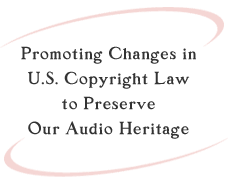
|
Some of the most vibrant and exciting evidence of the growth of America’s
diverse culture over
the past 120 years is found in historical sound
recordings. Yet unusual provisions of U.S. copyright law place
these recordings at risk of being lost forever. U.S. laws not only make it difficult for students, scholars and
the general public to hear and study our recorded legacy, they even place obstacles in the way of preserving these
recordings. Passage of the Music Modernization Act in 2018 was a good first step, but much work remains to be done.
Did you know that: Recordings as diverse as those of John Philip Sousa’s band, the very first African-American recording artists, immigrant groups, early jazz bands, symphony orchestras and even speeches by U.S. presidents are difficult to hear due to our dysfunctional copyright system. (For some examples, view the recording timeline.) HRCAP supports strong and effective copyright to protect legitimate interests of creators, but it also believes that copyright should not be used to lock up our history. The irony is that no one benefits under the current system, not the public, not recording artists, not even copyright owners. The goals of HRCAP are to advocate for changes to the law that respect creators but at the same time encourage the preservation of our rich and varied audio heritage, and enable greater public access to that heritage. If you share these goals, explore this site to learn more, sign our petition, or make a contribution to one of the organizations that make up HRCAP. Exciting developments: subsequent to the formation of HRCAP and the increased involvement of its members in Washington there have been several positive developments. In December 2011, after considerable study, the U.S. Copyright Office issued a report to Congress basically endorsing HRCAP's position and recommending that pre-1972 recordings be brought under federal law, which would for the first time establish a public domain for the oldest U.S. recordings. In February 2013 the Library of Congress issued its long-awaited National Recording Preservation Plan, which made the same recommendation and also urged action on orphan works and preservation exceptions. In 2018, after much haggling, Congress passed the Music Modernization Act which incorporates some of HRCAP's recommendations. We celebrate this long-overdue overhaul of American's terribly unbalanced copyright laws, and view it as a positive first step in the direction of preserving our recorded heritage and making it fully available to present and future generations. Tell Your Friends!Share this Web site with a friend! Just click on the button below to send a message to one or more friends and colleagues and let them know about what we are doing. News
|








